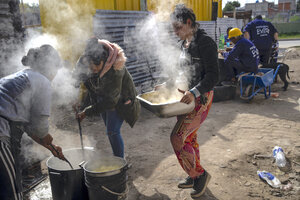Argentina’s lesson in equalizing justice
Many democracies are healthy enough to probe alleged misconduct of top leaders. For Argentina, the conviction of a former president marks a special moment against corruption.

Women cook at a soup kitchen to feed residents in the Puerta de Hierro neighborhood of Buenos Aires, Argentina.
AP
Nearly half of the world’s countries have at one time or another grappled with holding their leaders legally accountable for criminal conduct while in office. One of the more dramatic examples was this week’s conviction of Argentina’s former President (and current Vice President) Cristina Fernández de Kirchner. The verdict, said prosecutors, marks “a before and after in terms of political corruption.”
“Today justice gives us hope that citizens can trust their institutions” and that “ethical values and integrity become a guide to each person [who has] the responsibility of ... being accountable for acts of government,” said prosecutors Diego Luciani and Sergio Mola in a statement Tuesday.
Ms. Fernández de Kirchner, a former first lady known throughout Argentina simply as Cristina, was sentenced to six years for enriching herself and friends through a scheme to divert $1 billion in public works contracts during her presidency from 2007 to 2015. The sentence also bars her from seeking or holding public office, but it won’t take effect until her options to appeal have been exhausted. She has consistently painted the charges against her as political conspiracies.
Investigating a past or present head of state raises difficult questions about safeguarding the public good. Democracy rests on the principle that no one is above the law, but it can be hard to insulate legal action against political leaders from real or imagined partisan agendas. Even so, probes now unfolding in places like South Africa, Peru, and the United States offer a counterpoint to the narrative that democracy faces a global recession. All relate to alleged corruption or official misconduct in one form or another – and they are showing that the best way to strengthen representative government is through an active pursuit of honesty and equality.
The latest annual assessment of anti-corruption efforts in Latin America by the Americas Society and Council of the Americas found halting progress across the region. Argentina’s overall score has decreased over the past three years. But one measurement offers an insight into the public’s impatience with dishonest government. Public opinion had shifted away from the former president long before she was convicted. An opinion poll in August found that 67% wanted to see her put behind bars.
“In Argentina’s polarized environment, the trial of Cristina Kirchner was unlikely to be a painless process, even under the best of circumstances,” wrote Micah Rosen in the Global Anticorruption Blog. “Such cases are never easy. But there are ways to make the prosecution of powerful politicians more credible and more robust. If Argentinian democracy can survive the corruption of its leaders, it must take even greater pains to survive the response.”

